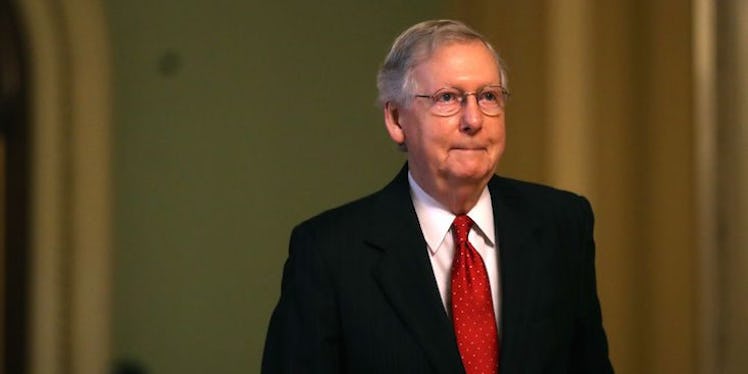
The Senate's "Skinny Repeal" Bill Would Lead To Millions Without Health Insurance
Following weeks of votes and years of saying they want to repeal and place the Affordable Care Act (ACA, aka Obamacare), Republicans released a "skinny repeal" plan on Thursday night, July 27. At around 11 p.m. ET on Thursday, the nonpartisan Congressional Budge Office (CBO) released their "skinny repeal" analysis. The CBO has been analyzing health care plans to see what the actual effects wold be, and this one isn't looking great for the GOP.
The "skinny repeal" plan was released by Mitch McConnell, the Senate Majority Leader, on Thursday night. They are calling it the "Health Care Freedom Act." The eight-page health care document is a more limited version of what McConnell wanted with a full on repeal of Obamacare.
Instead, this plan just takes away some part of Obamacare, including the individual mandate, which says people have to get insurance, and the employer mandate, which says companies with a lot of employees have to provide insurance to them. The plan also defunds Planned Parenthood for a year.
With all of these factors considered, the bill -- in spite of it's "skinny" reference name -- would have some pretty major effects, according to the CBO analysis.
Overall, the CBO says, the number of people without health insurance would rise to 16 million by 2026. But that's not the only effect. Premiums for individual (i.e. not through an employer) health plans would rise by about 20 percent from 2018 to 2026, so that insurance would cost more.
Meanwhile, health insurers themselves are wary of the GOP's plans. Earlier on Thursday, before the latest "skinny repeal" document was released, America's Health Insurance Plans, a major advocacy group of insurers, said in a letter that a "skinny repeal" would have awful effects on the insurance market.
"Policies that do not stabilize the market and simply drop incentives for people to buy coverage will repeat what we have seen in the past: premiums will rise rapidly, few or no affordable coverage options will be available and more people will be uninsured," Marilyn Tavenner, CEO of America's Health Insurance Plans, wrote in the letter.
So this planning isn't exactly looking too great. In any case, the Senate is set to vote on it overnight on Thursday and Friday morning.